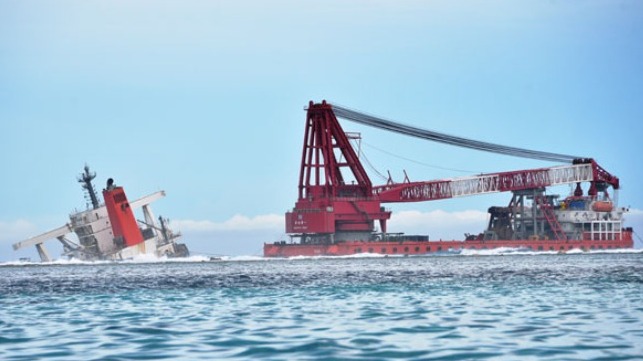ITF: Wakashio Case Highlights Growing Trend of Criminalizing Seafarers

The International Transport Workers' Federation is calling on the government of Mauritius to release the crew of the grounded bulker Wakashio, which struck a reef near Mahebourg one year ago.
“This week marks the one year anniversary of the grounding of the MV Wakashio and the environmental catastrophe associated with it. This week also marks one year since the Mauritian authorities have held members of the crew and prevented them from leaving the Republic, most have been effectively detained without charge,” said David Heindel, ITF Seafarers’ Section chair.
Heindel said the ITF and its affiliated seafarers’ unions have concerns about the treatment of the crew of the Wakashio by Mauritian authorities. Following the grounding of the Wakashio, Captain Sunil Kumar Nandeshwar and Chief Officer Tilakaratna Subodha were arrested. In August 2020 they were charged with endangering safe navigation, and they have been detained in prison since their arrest without bail. Most of the remainder of the crew have been detained under “house arrest” and kept in a local hotel, according to ITF, in what appears to be an effort to keep them on hand as witnesses in a future trial. Some of these crewmembers - who are essentially held without charges - had already been on board Wakashio for more than 12 months due to the crew change crisis and have now been away from their families for over two years.
“The ITF supports thorough, independent investigations of the factors relating to any maritime incident [but] we are concerned about the lack of appropriate legal proceedings taking place regarding the Wakashio crew," Heindel said. "Access to justice and fair treatment by the authorities are fundamental human rights guaranteed by the Universal Declaration of Human Rights. We believe the treatment experienced by the crew of the Wakashio violates their human rights."
According to ITF, the handling of the Wakashio incident fits a troubling pattern of "criminalization of seafarers" in the event of a marine casualty. The phenomenon has gained attention at ILO and IMO, and Heindel suggests that it should be shipowners rather than crewmembers who should be held accountable.
"We know that seafarers are seen by some officials as convenient bargaining chips in efforts to hold shipowners to account for maritime accidents caused by issues like a lack of maintenance. This is especially the case when a state finds it difficult to locate and prosecute irresponsible shipowners," said Heindel. "Seafarers are being cynically targeted all over the world by officials just for doing our jobs."

that matters most
Get the latest maritime news delivered to your inbox daily.
One new frontier: the criminalization of rescue at sea, as attempted in Italy under former Interior Minister Matteo Salvini and now potentially a concern in the UK under Home Secretary Priti Patel. Her proposed Nationality and Borders Bill new imposes criminal penalties for "knowingly facilitating" the transport of an asylum seeker to the UK, potentially including the delivery of rescuees to a UK port. Though immigration minister Chris Philp has promised that the section is not intended to apply to genuine sea rescue by the lifesaving organization RNLI, no language has been added to create a carve-out for SOLAS-mandated rescue at sea by good samaritan vessels.
"Under this new law, if seafarers save a person seeking asylum from drowning, they face life imprisonment. If they let them drown, then they could face prosecution in every country that has ratified [SOLAS] in addition to carrying the life-long emotional burden of knowing they could have saved a life, but did not," said Heindel. "In coming years, the world will likely see a rise in the number of persons seeking refuge from the effects of climate change, including those people fleeing fires, floods, rising sea levels and drought-induced famine. Now is not the time to be criminalizing seafarers for saving lives."
